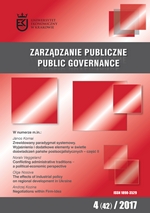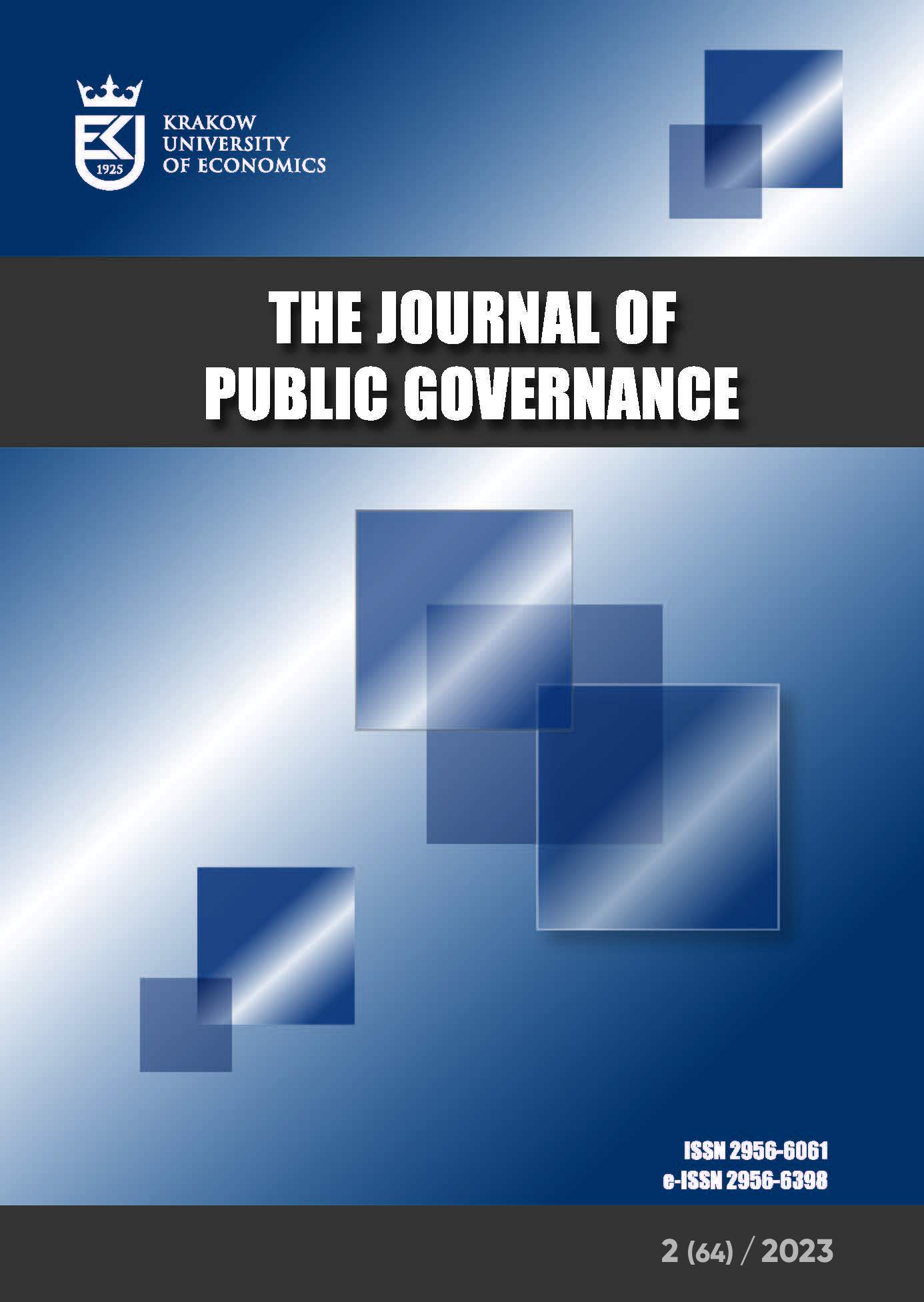Developing sustainable healthcare governance mechanisms to manage public-private partnerships
DOI:
https://doi.org/10.15678/ZP.2017.42.4.06Keywords:
zarządzanie projektami w ochronie zdrowia, interesariusze ochrony zdrowia, trwałość ochrony zdrowiaAbstract
Background: Despite a growing body of research literature focused on public-private partnerships (PPPs) in healthcare, some critical issues still seem to be insufficiently investigated, especially due to the frequent lack of clarity in defining the goals for healthcare management and to an oversimplified framework for analysing PPPs. Resolving conf licts of interest between diverse PPP stakeholders in healthcare requires special attention. Effective solutions in this area are not well known in Central and Eastern Europe countries, which are trying to modernise their healthcare systems.
Aims: The purpose of this article is threefold. Firstly, it is to establish an appropriate understanding of healthcare sustainability, currently understood as the ultimate goal for healthcare management. Secondly, it is to shift the context for analysing the performance of PPPs from a purely financial to a wider and well-framed one, comprising the pillars of healthcare sustainability. Thirdly, it is to identify the governance mechanisms intended to improve the impact of PPPs on healthcare sustainability.
Methods: The methods employed include a broad conceptual analysis of the international literature as well as external online desk research of the materials published by PPP consortia, financial institutions and public authorities engaged in managing PPPs for healthcare in Europe.
Results: Healthcare sustainability is a complex, multifaceted and multi-pillar problem. PPPs can enhance, or damage, all healthcare sustainability pillars due to a complex conf lict of interest between the parties involved. Embedding certain governance mechanisms in PPP contracting and management is necessary to foster both financial and nonfinancial
sustainability in healthcare provided via PPPs. Some countries and some PPPs have managed to develop suitable mechanisms to govern the conf licting goals in healthcare management.
Conclusions: The mechanisms governing PPPs can be programmed as sustainability drivers to improve the resilience of healthcare to the benefit of all stakeholder groups, including capital providers, society and the government. The experiences of PPPs in healthcare operating in the European context may inspire an appropriate design of the PPP framework and PPP contracts.
Downloads
References
Alexander, K., Brown, M. (2006). Communitybased facilities management. Facilities, 24 (7/8), 250–268.
Barlow, J., Roehrich, J., Wright, S. (2013). Europe sees mixed results from public-private partnerships for building and managing health care facilities and services. Health Affairs, 32 (1), 146–154.
Bauzon, S. (2015). Classical distributive justice and the European healthcare system: Rethinking the foundations of European health care in an age of crises. Journal of Medicine and Philosophy, 40 (2), 190–200.
Birch, S., Murphy, G.T., MacKenzie, A., Cumming, J. (2015). In place of fear: Aligning health care planning with system objectives to achieve financial sustainability. Journal of Health Services Research & Policy, 20 (2), 109–114.
Boone, T. (2012). Organizing for sustainability: Exploratory analysis of the healthcare industry. In T. Boone, V. Jayaraman, R. Ganeshan (red.), Sustainable Supply Chains (pp. 37–48). New York: Springer.
Borgonovi, E., Compagni, A. (2013). Sustaining universal health coverage: The interaction of social, political, and economic sustainability. Value in Health, 16 (1), 34–38.
Broadbent, J., Gill, J., Laughlin, R. (2008). Identifying and controlling risk: The problem of uncertainty in the private finance initiative in the UK’s National Health Service. Critical Perspectives on Accounting, 19(1), 40–78.
Buffoli, M., Capolongo, S., di Noia, M., Gherardi, G., Gola, M. (2015). Healthcare sustainability evaluation systems. In S. Capolongo, M.C. Bottero, M. Buffoli, E. Lettieri (eds), Improving Sustainability During Hospital Design and Operation (pp. 23-29). Springer International Publishing.
Capolongo, S., Bottero, M.C., Buffoli, M., Lettieri, E. (eds.) (2015). Improving Sustainability During Hospital Design and Operation: A Multidisciplinary Evaluation Tool. Springer International Publishing.
Canadian Medical Association (CMA) (2010). Health Care Transformation. Retrieved from: www.cma.ca (11.06.2013).
De Clerck, D., Demeulemeester, E. (2016). An ex ante bidding model to assess the incentive creation capability of a public–private partnership pipeline. International Journal of Project Management, 34 (1), 117–131.
EBRD (2016). Koaceli Hospital PPP. Retrieved from: www.ebrd.com/work-with-us/projects/psd/kocaeli-hospital-ppp.html (15.07.2017).
European Commission (EC) (2011). Health and Economics Analysis for an Evaluation of the Public Private Partnerships in Health Care Delivery Across EU. Retrieved from: https://ec.europa.eu/health/expert_panel/sites/expertpanel/files/ppp_finalreport_en.pdf (1.03.2017).
European Commission (EC) (2014). Expert Panel on Effective Ways of Investing in Health. Retrieved from: https://ec.europa.eu/health/expert_panel/sites/expertpanel/files/003_assessmentstudyppp_en.pdf (15.07.2017).
Engel, E., Fischer R., Galetovic, A. (2008). Public-Private Partnerships: When and How. Cowles Foundation for Research in Economics, Yale University.
Engel, E., Fischer, R., Galetovic, A. (2013). The basic public finance of public–private partnerships. Journal of the European Economic Association, 11 (1), 83–111.
ESG (2015). Acting Together: A Roadmap for Sustainable Healthcare. European Steering Group on Sustainable Healthcare.
Grimshaw, D., Vincent, S., Willmott, H. (2002). Going privately: Partnership and outsourcing in UK public services. Public Administration, 80 (3), 475–502.
HM Treasury (2012). A New Approach to Public Private Partnerships. Retrieved from: www.gov.uk/government/uploads/system/uploads/attachment_data/file/205112/
pf2_infrastructure_new_approach_to_public_private_parnerships_051212.pdf (15.07.2017).
Institute of Public Administration (IPA) (2013). Public Service Motivation. Retrieved from: www.ipa.ie/pdf/PublicServiceMotivation.pdf (27.02.2017).
Invest Lithuania (2016). PPP in Lithuania Overview of PPP Climate & Opportunities. Retrieved from: www.investlithuania.com/wp-content/uploads/2014/03/PPP-in-Lithuania-Overview-of-climate-and-opportunities.pdf (25.07.2017).
Kaplan, R.S., Porter, M.E. (2011). How to solve the cost crisis in health care. Harvard Business Review, 89 (9), 46–52.
Koppenjan, J.F., Enserink, B. (2009). Public–private partnerships in urban infrastructures: Reconciling private sector participation and sustainability. Public Administration Review, 69 (2), 284–296.
Laba, T.L., Usherwood, T., Leeder, S., Yusuf, F., Gillespie, J., Perkovic, V., Essue, B. (2015). Copayments for health care: What is their real cost? Australian Health Review, 39 (1), 33–36.
Luo, Y., Liang, F., Ma, Z. (2013). The effects of contractual governance and relational governance on construction project performance: An empirical study. International Journal of Digital Content Technology and its Applications, 7 (8), 741.
Leenaars, K., Jacobs-van der Bruggen, M., Renders, C. (2013). Determinants of successful public-private partnerships in the context of overweight prevention in Dutch youth. Preventing Chronic Disease, 10.
Leisink, P., & Steijn, B. (2009). Public service motivation and job performance of public sector. employees in the Netherlands. International Review of Administrative Sciences, 75 (1), 35–52.
Maarse, H., Jeurissen, P., Ruwaard, D. (2013). Concerns over the financial sustainability of the Dutch healthcare system. DICE Report, 11 (1), 32–37.
Marchegiani, L., Nenni, M. E., Peruffo, E., Pirolo, L. (2012). Linking value assessment to the business model framework in high innovative services of public utility – A simulation from the aerospace industry. International Journal of Economics and Management Engineering, 2 (3), 98–103.
Marty, D., Rapp, C., McHugo, G., Whitley, R. (2008). Factors inf luencing consumer outcome monitoring in implementation of evidence-based practices: Results from the National EBP Implementation Project. Administration and Policy in Mental Health and Mental Health Services Research, 35 (3), 204–211.
Moro Visconti, R. (2014). Multidimensional principal–agent value for money in healthcare project financing. Public Money &Management, 34 (4), 259–264.
Nikolic, I. A., Maikisch, H. (2006). Public-Private Partnerships and Collaboration in the Health sector: An Overview with Case Studies from Recent European Experience. HNP Discussion Paper. Retrieved from: http://documents.worldbank.org/curated/en/909-681468 139198131/pdf/378070Public0p1artnerships01PUBLIC1.pdf (25.07.2017).
Organisation for Economic Co-operation and Development (OECD) (2010). Health System Priorities When Money is Tight. OECD Health Ministerial Meeting, Paris, 7–8 October, Paris: OECD. Retrieved from: www.oecd.org/health/ministerial/46098466.pdf.
Peters, B.G., & Pierre, J. (2010). Public-private partnerships and the democratic deficit: Is performance-based legitimacy the answer?. In M. Bexell, U. Mörth (red.), Democracy and Public-Private Partnerships in Global Governance (pp. 41–54). Palgrave Macmillan UK.
Peters, B.G., Pierre, J., Röiseland, A. (2014). Financial gains and value loss? The impacts of local mixed companies. Annals of Public and Cooperative Economics, 85 (1), 87–102.
Phiri, M., Chen, B. (2014). Sustainability and Evidence-Based Design in the Healthcare Estate. Berlin, Heidelberg: Springer.
Pluye, P., Potvin, L., Denis, J.L. (2004). Making public health programs last: Conceptualizing sustainability. Evaluation and Program Planning, 27 (2), 121–133.
Proctor, E., Luke, D., Calhoun, A., McMillen, C., Brownson, R., McCrary, S., Padek, M. (2015). Sustainability of evidence-based healthcare: Research agenda, methodological advances, and infrastructure support. Implementation Science, 10 (1), 88.
Ritz, A. (2009). Public service motivation and organizational performance in Swiss federal government. International Review of Administrative Sciences, 75 (1), 53–78.
Rodriguez-Mozaz, S., Chamorro, S., Marti, E., Huerta, B., Gros, M., Sànchez-Melsió, A., Balcázar, J.L. (2015). Occurrence of antibiotics and antibiotic resistance genes in hospital and urban wastewaters and their impact on the receiving river. Water Research, 69, 234–242.
Samad, L., Iqbal, M., Tariq, A., Shahzad, W., Khan, A.J. (2015). Equitable access to comprehensive surgical care: The potential of indigenous private philanthropy in low-income settings. World Journal of Surgery, 39 (1), 21–28.
Sarvi, J.E, Balaji, V., Pillay, H.K. (2015). Publicprivate partnerships in information and communication technology for education. ADB Briefs, 49 (1), 1–8.
Scherer, A. G., & Palazzo, G. (2011). The new political role of business in a globalized world: A review of a new perspective on CSR and its implications for the firm, governance, and democracy. Journal of Management Studies, 48 (4), 899–931.
Stirman, S.W., Kimberly, J., Cook, N., Calloway, A., Castro, F., Charns, M. (2012). The sustainability of new programs and innovations: A review of the empirical literature and recommendations for future research. Implement Sci. 7 (17), 1–19.
Ugarte, C., Gutierrez, G., Phillips, N. (2012). A roadmap to funding infrastructure development, Cintra Infraestructuras S.A., Spain, International Transport Forum Discussion Paper OECD Publishing, pp. 1–8.
United Nations (UN) (1987). Report of the World Commission on Environment and Development: Our Common Future. Retrieved from: www.un-documents.net/our-common-future.pdf (26.07.2017).
www.nyakarolinskasolna.se/en/The-New-Hospital (15.07.2017).
Downloads
Published
How to Cite
Issue
Section
License
Open Access, licence: CC-BY 4.0




